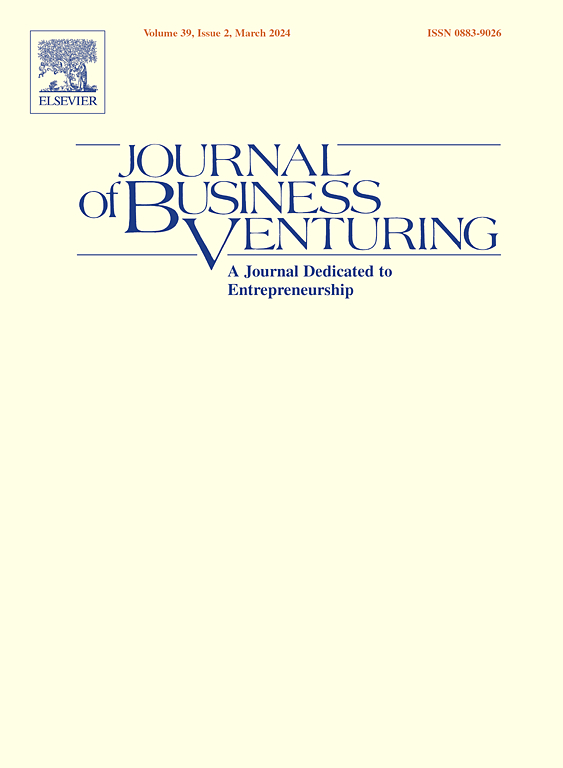Director turnover in new venture boards: From homophilous to resource-contingent processes
IF 8.9
1区 管理学
Q1 BUSINESS
引用次数: 0
Abstract
While resource-dependency theories suggest that heterogenous directors in new venture boards contribute important knowledge and networks, research on boardroom homophily highlights that dissimilar directors are more likely to leave, especially under adverse conditions. To date, there is limited evidence on whether such mechanisms also prevail in the venture context where founder-managers retain excessive control over director appointments. We analyze director tenure in 28,295 Swedish ventures, finding that dissimilar directors are more likely to leave the board when ventures are operating in favorable conditions but only when considering knowledge diversity. Post-hoc analyses of directors' post-exit career paths and qualitative interviews with CEOs and directors help clarify the mechanisms that cause diverse directors to depart venture boards more often. Specifically, lifecycle demands and venture profitability ease resource-dependence pressures on director retention, thus feeding homogeneity in board expertise. Our findings provide insights into the homogenizing nature of new ventures' upper echelons as they evolve into mature organizations.
Executive summary
Boards are a vital resource for early-stage ventures, offering advice, funding connections, and strategic guidance — especially when directors bring diverse expertise. Yet, as ventures grow and succeed, that diversity can erode. Our study of over 28,000 Swedish owner-managed firms shows that directors whose expertise differs from that of the founder(s) are more likely to leave—not during hardship, but when the business is performing well. Interviews with several founders and directors further suggest that as ventures mature, they increasingly rely on internal capabilities and shift toward boards that reflect the founder's evolving preferences. These dynamics lead to more homogenous boards over time, potentially narrowing the range of perspectives available in the board. For founders and policymakers, the findings highlight a key challenge: keeping diverse directors around not just at the start, but as the company scales.
新企业董事会的董事更替:从同质过程到资源偶然过程
虽然资源依赖理论认为,异质董事在新创企业董事会中贡献了重要的知识和网络,但对董事会同质性的研究强调,异质董事更有可能离开,尤其是在不利条件下。迄今为止,关于这类机制是否也适用于创始人经理对董事任命保持过度控制权的风险环境的证据有限。我们分析了28,295家瑞典企业的董事任期,发现当企业经营条件有利时,不同类型的董事更有可能离开董事会,但只有在考虑知识多样性的情况下。对董事离职后职业路径的事后分析,以及对ceo和董事的定性访谈,有助于阐明导致不同类型董事更频繁地离开风险投资董事会的机制。具体而言,生命周期需求和风险盈利能力缓解了董事留任的资源依赖压力,从而助长了董事会专业知识的同质性。我们的研究结果提供了新企业高层在发展为成熟组织时的同质化本质的见解。执行摘要委员会是初创企业的重要资源,可以提供建议、融资联系和战略指导——尤其是在董事拥有多种专业知识的情况下。然而,随着企业的成长和成功,这种多样性可能会受到侵蚀。我们对28000多家瑞典业主管理公司的研究表明,那些专业知识与创始人不同的董事更有可能离开——不是在困难时期,而是在企业表现良好的时候。对几位创始人和董事的采访进一步表明,随着企业的成熟,它们越来越依赖内部能力,并转向反映创始人不断变化的偏好的董事会。随着时间的推移,这些动态导致董事会更加同质化,潜在地缩小了董事会中可用视角的范围。对于创始人和政策制定者来说,这些发现凸显了一个关键挑战:不仅在公司成立之初,还要在公司规模扩大的过程中保持董事的多元化。
本文章由计算机程序翻译,如有差异,请以英文原文为准。
求助全文
约1分钟内获得全文
求助全文
来源期刊

Journal of Business Venturing
BUSINESS-
CiteScore
16.70
自引率
6.90%
发文量
59
审稿时长
77 days
期刊介绍:
The Journal of Business Venturing: Entrepreneurship, Entrepreneurial Finance, Innovation and Regional Development serves as a scholarly platform for the exchange of valuable insights, theories, narratives, and interpretations related to entrepreneurship and its implications.
With a focus on enriching the understanding of entrepreneurship in its various manifestations, the journal seeks to publish papers that (1) draw from the experiences of entrepreneurs, innovators, and their ecosystem; and (2) tackle issues relevant to scholars, educators, facilitators, and practitioners involved in entrepreneurship.
Embracing diversity in approach, methodology, and disciplinary perspective, the journal encourages contributions that contribute to the advancement of knowledge in entrepreneurship and its associated domains.
 求助内容:
求助内容: 应助结果提醒方式:
应助结果提醒方式:


